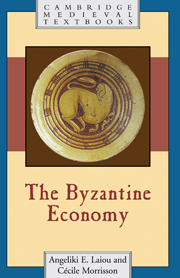Book contents
- Frontmatter
- Contents
- List of maps
- List of figures
- List of tables
- Acknowledgements
- List of abbreviations
- Introduction
- I Natural and human resources
- II The Late Antique economy and the shift to medieval structures (sixth–early eighth centuries)
- III Restructuring, recovery and controlled expansion (early eighth to tenth centuries)
- IV The age of accelerated growth (eleventh and twelfth centuries)
- V Small-state economics (from sometime in the thirteenth century to the fifteenth century)
- VI The Byzantine economy as exemplar; the Byzantine and the Western medieval economies
- Select bibliography
- Index
- Cambridge Medieval Textbooks
Introduction
Published online by Cambridge University Press: 05 June 2012
- Frontmatter
- Contents
- List of maps
- List of figures
- List of tables
- Acknowledgements
- List of abbreviations
- Introduction
- I Natural and human resources
- II The Late Antique economy and the shift to medieval structures (sixth–early eighth centuries)
- III Restructuring, recovery and controlled expansion (early eighth to tenth centuries)
- IV The age of accelerated growth (eleventh and twelfth centuries)
- V Small-state economics (from sometime in the thirteenth century to the fifteenth century)
- VI The Byzantine economy as exemplar; the Byzantine and the Western medieval economies
- Select bibliography
- Index
- Cambridge Medieval Textbooks
Summary
The Byzantine Empire was a state with extraordinary and enviable longevity. Formally, it may be said to have begun in 330, with the dedication of the new city of Constantinople, and to have ended in 1453. Even if one considers that the changes which occurred in the seventh century were substantive enough to signal a new era (and we think this argument can certainly be made with regard to the economy), that is still a period of eight hundred years. Certainly, society underwent considerable and continuous change over the centuries, and so did institutions. So, too, did the economy, which lay at the foundation of the society and the state. Neither the great wealth of tenth- or twelfth-century Byzantium, which so impressed Western European travelers and even Arab witnesses, nor the progressive impoverishment of the late period can be properly gauged without a deep understanding of how the economy developed.
It should not be necessary to justify the need to study the economy of the Byzantine Empire. The economic history of the Western Middle Ages is a well-established discipline, with a long pedigree and numerous practitioners of remarkable scholarship. The Byzantine state was an important and, for a long time, a highly developed part of Europe, yet its economy is only very rarely incorporated into studies of the Middle Ages, and as a discipline it has developed only over the last few decades.
- Type
- Chapter
- Information
- The Byzantine Economy , pp. 1 - 7Publisher: Cambridge University PressPrint publication year: 2007

